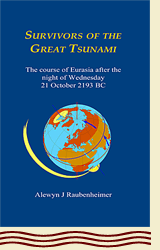Synopsis
 "Survivors of the Great Tsunami" is a factual account of the uncovering of the most advanced civilization in Early Antiquity. This West European empire from more than 4000 years ago is unknown to, or has been denied by historians to this day.
"Survivors of the Great Tsunami" is a factual account of the uncovering of the most advanced civilization in Early Antiquity. This West European empire from more than 4000 years ago is unknown to, or has been denied by historians to this day.
The book examines an ancient manuscript discovered in the Netherlands in 1867. The manuscript was subsequently declared a fraud by Dutch linguists and parroted by historians. By now comparing this manuscript with numerous authors from antiquity, as well as testing the claims made in it against modern sciences such as archaeology, paleoclimatolgy, genetics, linguistics, oceanography and many more, the manuscript was found to be true in every instance. These modern discoveries were yet to be made in the 19th century when the manuscript first came into the public domain. Europe’s "Rosetta Stone" had been found.
The reader is taken on a journey to examine the memoirs and reports of men and women from Western Europe who suffered the biggest catastrophe in the recorded history of mankind; the catastrophe that killed millions and became known as "The Deluge" or "Noah’s Flood" . The manuscript reflects the sagas and adventures of these people as they led other survivors of the disaster from all over the world out of the Stone- and Bronze Ages into the Iron Age.
The pioneers from Europe’s western seaboard founded the ancient civilizations from Greece to Persia. They introduced the world to carbonized steel, chariot warfare, cavalry charges astronomy and mathematics. They gave man the "Greek alphabet", "Indo-Arabian numerals", democracy, free enterprise and monotheism. Four thousand years ago they even tried their hand at arms control and nature conservation.
The author provides maps and satellite images as proof of the existence of this forgotten civilization whose extent was greater than that of the European Union. The reader is also presented with ancient maps and irrefutable photographic evidence of an inhabited land the size of Britain which now lies more than 1000 meters below the cold waters of the North Atlantic.
The startling but well substantiated disclosures in "Survivors of the Great Tsunami" suggest that hereto accepted European, Asian and World history had been severely compromised in the past. For too long have historians, linguists, geneticists and others denied the pivotal role that Western Europe had played in early world history. Their legacy is incalculable. It is time they get their due recognition or, as Homer put it, "their due meed of glory".
